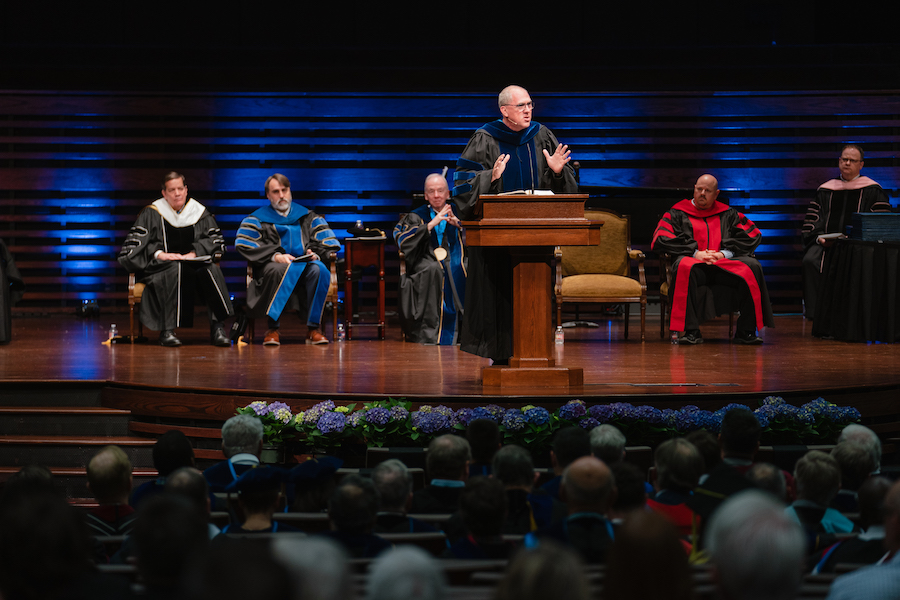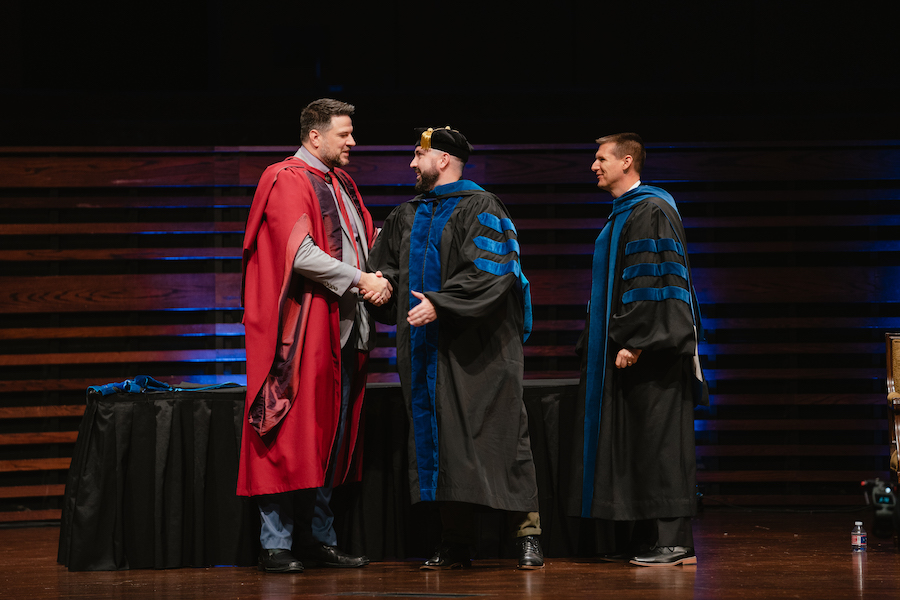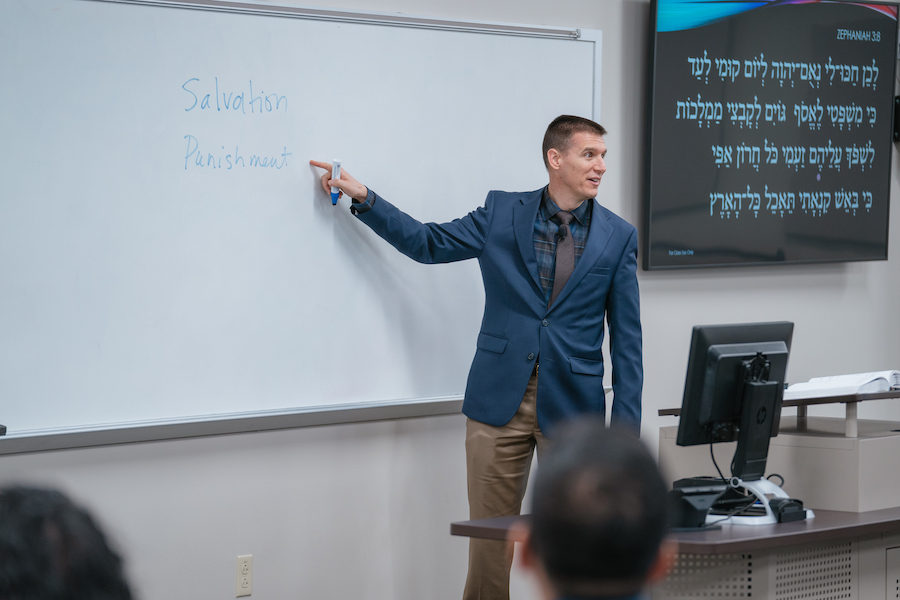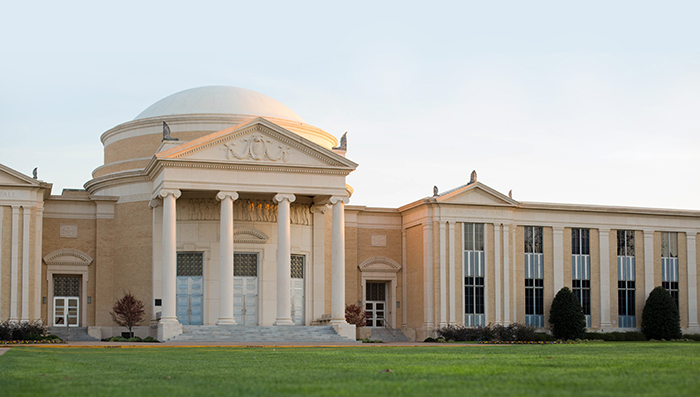Of all the pinnacles of his life, Taylor says the student is still his ‘high point’
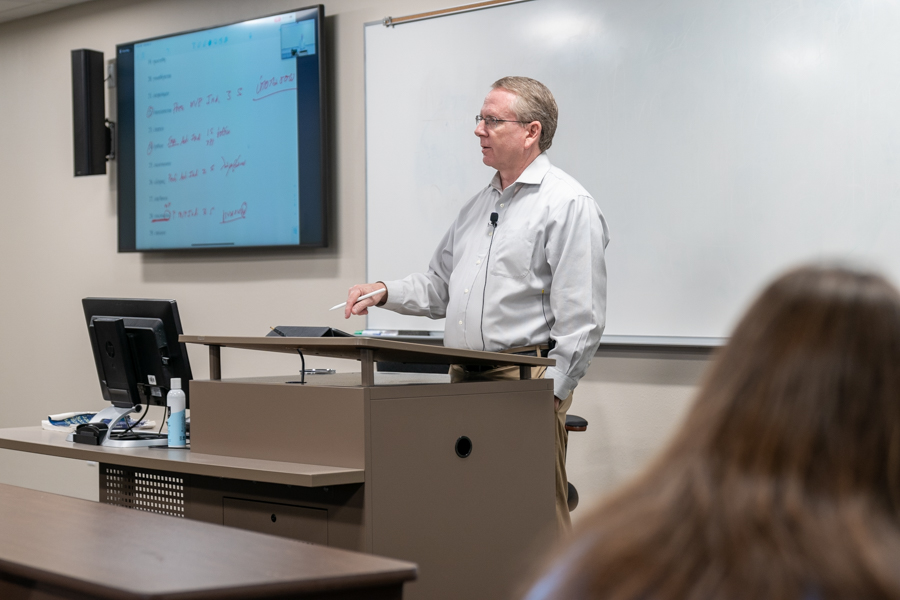
While Mark E. Taylor, associate dean of the School of Theology and professor of New Testament at Southwestern Baptist Theological Seminary, has had many pinnacles in his nearly 25 years at the seminary, he said that ultimately, it is “the student in the classroom, that’s the high point.”
Taylor admits it is hard to rank his high points since he began to teach in 1998, three years prior to completing his doctorate in New Testament from Southwestern. “I feel like in some ways, I’ve been on the mountaintop the whole time, just doing what I love to do because I really love to teach in the classroom, just engaging with students helping them to get started in this process of ministry,” Taylor said.
Last spring, Taylor was the first professor to receive the David S. and Lanese Dockery Faculty Award for Teaching Excellence, established by Dockery, now Southwestern’s interim president, which is given in honor of a “faculty member who exhibits faithful and effective teaching in the classroom and shows genuine demonstration of personal care and concern for spiritual development of students in and outside of the classroom.”
“I didn’t know it was coming. It was announced at the May graduation, so I didn’t know about it until my name was called,” Taylor said. “I just thoroughly enjoy and never grow tired of teaching Greek every year, teaching the same subject to new students.”
Looking back, he recalled several fond but challenging pinnacles along the way. “Just the completion of the dissertation is a high point. And then having that published is a high point,” Taylor said.
Taylor is the author of the New American Commentary (NAC) on 1 Corinthians, published by Broadman and Holman Publishers, which was released in 2014. “Completing the commentary, a seven-year project, and bringing that to completion, that’s also a pinnacle,” he said.
But even for that project, which he began in 2006, he attributes the result in part from being in the classroom. “So, the classroom helped me in developing the commentary. And now the finished product circles back around and helps me in the classroom,” Taylor said.
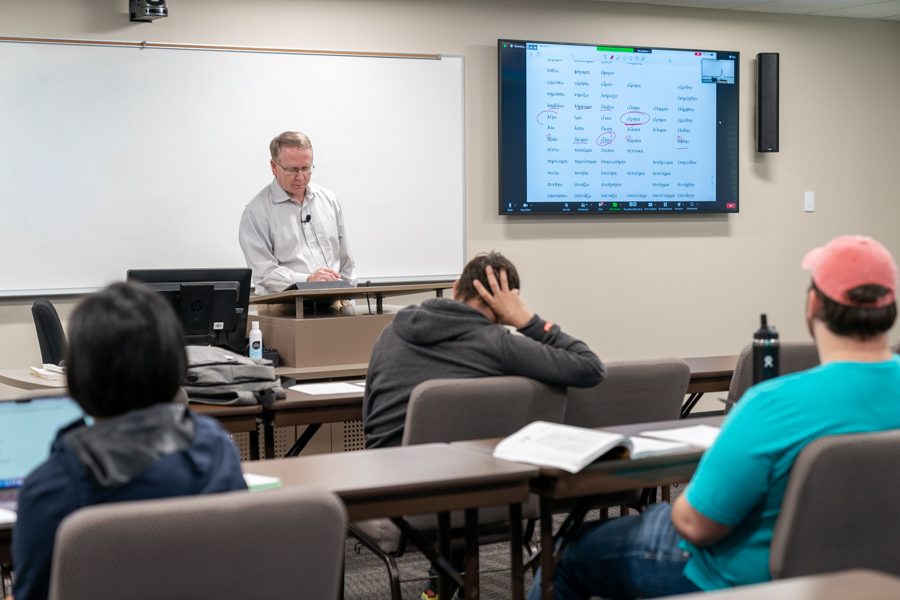
Mark E. Taylor, associate dean of the School of Theology and professor of New Testament at Southwestern Baptist Theological Seminary says that the student is the highlight of his career.
Taylor values the student and the classroom because of what he received from his professors, beginning at Mid-America Baptist Theological Seminary, where he earned a Master of Divinity in 1990. Professors like Richard R. Melick, Jr., now senior distinguished professor of New Testament studies at Gateway Seminary, “had one of the most profound impacts. His commitment to the Greek, his commitment to accuracy, accurately interpreting the Scriptures, and just drawing the meaning of the text and communicating that very well.”
Later, while serving as a “young interim pastor,” Taylor went to the Southern Baptist Convention annual meeting in Atlanta, Georgia, in 1991 and had Melick autograph his copy of the NAC volume on Philippians, Colossians, and Philemon. “Little did I know, nearly 20 years later, I would be publishing the 1 Corinthians volume in the same commentary series,” Taylor said.
While he said “not in the least” did he imagine he would write something as momentous as that, he always had a desire to write a commentary. “Because I love the study. I love the teaching. I love the research. And I’ve always felt like that I had an ability to take things and make them clear to someone else. So to teach, to teach clearly, is something I’ve felt that I’ve had a gift to do.”
Taylor continues to press on to higher pinnacles, teaching this semester for the first time 1 and 2 Peter and Jude. “I spent more than two years getting ready for the course. After all these years, I’ve learned so much more about those books because I had to prepare. Education is something that never ceases. You just keep learning, keep going. You realize it’s never-ending.”
Taylor served as pastor of First Baptist Church of Osceola, Arkansas, for four years, during which time he met Ann Jones, whom he married in 1994. They now have three adult daughters, including one who is in full-time ministry and attends Southwestern Seminary.
Even as a pastor, Taylor said, “I was a teaching pastor and I loved expository preaching, expository teaching. And so I always had a desire to one day, either to teach in a setting like I’m teaching in now or to get further training just to be a better teaching pastor.” They came to Fort Worth in 1995 for his doctorate. “I wanted the best preparation that I could get.”
At Southwestern, Tommy Lea, who was named dean of Southwestern’s School of Theology the same year that Taylor came to Fort Worth, was his first research seminar professor and signed off on his perspective. Following Lea’s death, Bruce Corley, a long-time professor of New Testament at Southwestern, became Taylor’s dissertation supervisor, and he interacted with the “Southwestern faculty of yesteryear” including being a Teaching Assistant (TA) for the late Jack MacGorman, the legendary New Testament professor who taught at Southwestern for five decades and passed away last December at age 100.
“I have had so many great mentors like Tommy Lea, Curtis Vaughn, Richard Melick, Kendell Easley, who loved us as students,” Taylor said. “They instilled something in us. They loved the local church. They wanted to see us succeed in our ministries. And to me, it’s a great responsibility. If you’ve been around people like that, that means God is asking you to do something with it. I feel like it’s a great privilege to carry that heritage.”
One of Taylor’s students, Kelsey Stookey, an Master of Divinity in theology student from McKenzie, Tennessee, said she took Biblical Greek I and II in the same course in the same semester, also known as Turbo Greek, with Taylor after “I had heard incredible things about him as a professor and he lived up to all of them.” Describing Taylor as “so reassuring,” she said, “he cares about his students deeply. He wants us to excel academically, but he also wants to know us personally.”
After sharing with him that she was going to teach at a girls’ retreat, and that the Greek class had helped her prepare, “He provided me with extra resources so that I could teach middle school and high school girls with excellence. He didn’t just wish me well or send me on my way, he talked with me [about] what I planned to teach and then gave me personal outlines that he had created for that book of the Bible in case I got stuck.”
Federico Fretes is from Paraguay, South America, and started his Master of Divinity in New Testament last fall. “I was impacted by Dr. Taylor the very first day I met him at a luncheon before I started taking classes. He was at my table, telling us about his life and how he got to Southwestern,” Fretes recalled.
“He said, ‘God gave me the privilege of training leaders, and I cannot ask for anything else,’” Fretes said. “I instantly noticed he was passionate when telling us about what God did in His life. God used this opportunity to remind me of what is most important: It is not about how smart we are but about living His calling. It is all about the fire the Lord puts into our hearts to serve others.”
Fretes added that classes like Taylor’s at Southwestern have “high academic quality,” but also “you get the gift of friendship that gives you an iron sharpens iron experience.”
Taylor said he learned a valuable lesson from serving under Lea.
“Tommy Lea one time told me this, ‘Mark, sometimes you have professors that can take a few to great heights. And then you have some professors who can take the large group, the masses, and they can carry them along. They might not develop the next great biblical scholar, but they’re able to carry the whole group with them,’” Taylor recalled.
“Tommy Lea would take the whole group to where they needed to be. And I think that’s been the aim of my teaching all these years. What he instilled in me is what I’ve tried to model. You have to realize you’re taking the whole group. It’s great when you produce scholars. We all love that. But we’re here to train people for the local church,” Taylor concluded.
